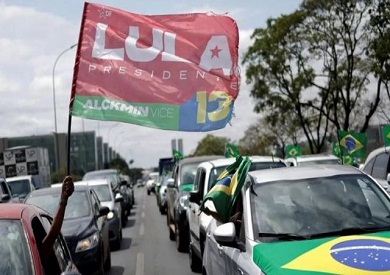According to the Asharq Al-Awsat newspaper, former leftist president Luis Inacio Lula da Silva won the first round of the Brazilian presidential election, beating out incumbent right-wing president Jair Bolsonaro. However, his performance fell short of what polls had predicted, necessitating the holding of a second round on October 30.
According to data from the Supreme Electoral Court, 47.91% of the vote went to Lula, compared to 43.65% for Bolsonaro, with 97.3% of the ballots counted.
In a poll released on the day of the election, renowned polling organisation Datavolha awarded the former president 50% of the vote to Bolsonaro’s 36%, bringing the veteran leftist candidate within reach of a first-round triumph.
At the start of the count, Bolsonaro had a slim five-point lead against Lula, which led to jubilation in his campaign.
At the Lula Campaign Center in Sao Paulo, well-known indigenous leader and congressional candidate Sonia Guajajara said, “Everyone is frightened about the early results.” However, Bolsonaro receives the strongest support from the states where the count has progressed. The score will be corrected.
At the presidential mansion in Brasilia, Bolsonaro and members of his inner circle were keeping an eye on the results.
Long lines of voters were reportedly seen at polling places that closed at 5 p.m.
Brazilians voted in large numbers in a tense election plagued by periodic violence and worries that Bolsonaro could lead to a dramatic rise in gun ownership.
Two officers were wounded after being shot by a guy who entered a polling place in Sao Paulo, according to military police.
Most surveys have Lula leading by 10 to 15 percentage points, but Bolsonaro has made it seem like he won’t concede, which raises concerns of an institutional crisis.
The outcome of Brazil’s most divisive election in decades will determine whether a former president who was imprisoned for corruption charges or a right-wing populist who has criticised the electoral process and pledged to contest his defeat will take office again.
In the final discussion before the election, Bolsonaro and Lula both accused one another of corruption.
Former President Luiz Inacio Lula da Silva, a socialist adversary, was referred to by President Bolsonaro as the leader of a criminal gang that presided over a “government of thieves” from 2003 to 2010 during his two terms in office.
Lula, on the other hand, branded Bolsonaro a “shameless” liar whose administration covered up corruption in the purchase of vaccinations during the Covid-19 outbreak, which claimed the lives of more than 680,000 Brazilians.
The National Elections Authority in Brazil is able to quickly tally results hours after polls shut because to the country’s computerised voting technology, which Bolsonaro has repeatedly attacked as susceptible to fraud without presenting evidence.
The National Polls Authority invited a record number of foreign observers to this year’s elections because to Bolsonaro’s attacks on the electoral process and the likelihood of confrontation.
Brazil’s presidential elections are moving toward a second round after close results between Lula and Bolsonaro

